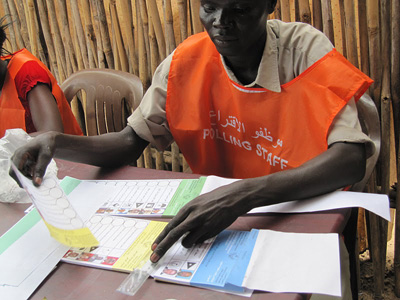
Voting in Sudan’s first multi-party elections in 24 years kicked off yesterday despite opposition boycotts, well-documented electoral rigging, and widespread political oppression clouding the exercise’s legitimacy. The first two days of polling passed in relative calm, marred largely by technical irregularities throughout the country that prompted the electoral commission to extend the voting period by two days.
In the South, the inaugural day started off slowly, with many polling stations opening hours later than the 8 a.m. promised start time. Even South Sudanese President Salva Kiir, who was voting for the first time, was forced to wait almost an hour before his polling station was set up.
Misinformation about which polling stations to go to have left many Southern voters confused, even disenfranchised. Though voters were told when they registered last year to return to their registration sites on election day, many peoples’ names were often transferred to other polling stations without being told. Without transportation or the know-how to navigate the many stations, voters often gave up.
Enough’s Maggie Fick in Juba spoke to Raya Omar, 24, and her friend Florence, who both registered at the same center at the University of Juba last November. Yesterday when the polls opened in Juba, Raya and Florence went to the university to cast their votes, but Florence’s name was not on the list. “We’ve been trying to find her name at nearby stations,” said Raya, as her friend continued to scan the list of names posted on a wall at one of the polling stations at the university.
Technical problems were also widely documented in the North. Several instances of incorrect ballots being delivered, or candidates’ symbols being left off of ballots were reported by the African Centre for Justice and Peace Studies. In the northeastern town of Barbar, in River Nile State, the symbols of two candidates, which were of a bicycle and an ear of corn, were exchanged, increasing the chances that illiterate voters would vote for the wrong party.
According to the Sudan Tribune, eight candidates have already withdrawn from the race since the polls opened, protesting the omission of their symbols on ballots.
These latest irregularities only top the already large number of obstacles in place preventing Sudan’s historic elections from being free, fair, and (per the spirit of the Comprehensive Peace Agreement) “democratically transformative.” The ruling party’s decision to retain a politically restrictive and insecure environment months before polls opened indicated the direction that elections would take long ago. Though the U.S. administration continues to look toward the silver lining and to lower its democratic standards with regards to these elections, it is imperative that the final judgment issued is based not only what takes place during these five days, but accounts for the lack of political space and freedoms allowed to the Sudanese people from the start of the electoral period.

